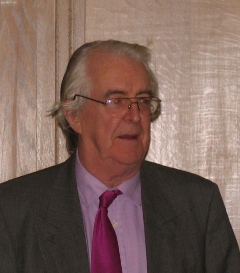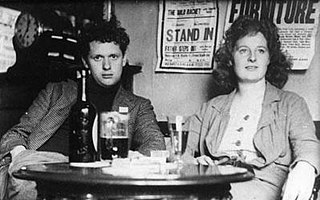A Quote by Dion Fortune
The true secret of natural goodness lies in the recognition of the contending rights of the Pairs of Opposites; there is no such antimony as between Good and Evil, but only balance between two extremes, each of which is evil when carried to excess, both of which give rise to evil if insufficient for equipoise.
Related Quotes
When one has once accepted and absorbed Evil, it no longer demands the unfitness of the means. The ulterior motives with which youabsorb and assimilate Evil are not your own but those of Evil.... Evil is whatever distracts. Evil knows of the Good, but Good does not know of Evil. Knowledge of oneself is something only Evil has. One means that Evil has is the dialogue.... One cannot pay Evil in installments--and one always keeps on trying to.
When anything is in the presence of evil, but is not as yet evil, the presence of good arouses the desire of good in that thing; but the presence of evil, which makes a thing evil, takes away the desire and friendship of the good; for that which was once both good and evil has now become evil only, and the good has no friendship with evil.
The choice before human beings, is not, as a rule , between good and evil but between two evils. You can let the Nazis rule the world : that is evil; or you can overthrow them by war , which is also evil. There is no other choice before you, and whichever you choose you will not come out with clean hands.
It is in vain that we search for an essential difference between good and evil, for their constituents are the same. The crucial distinction lies in their structure, i.e., the manner in which the pieces are assembled. Evil is disintegration, an angry juxtaposition of alienated opposites, with parts always striving to repress other parts. Good is the synthesis and reconciliation of these same pieces.
My study of Gandhi convinced me that true pacifism is not nonresistance to evil, but nonviolent resistance to evil. Between the two positions, there is a world of difference. Gandhi resisted evil with as much vigor and power as the violent resister, but True pacifism is not unrealistic submission to evil power. It is rather a courageous confrontation of evil by the power of love. . . .
This is a world of good and evil. Wherever there is good, evil follows, but beyond and behind all these manifestations, all these contradictions, the Vedanta finds out that Unity. It says, "Give up what is evil and give up what is good." What remains then? Behind good and evil stands something which is yours, the real you, beyond every evil, and beyond every good too, and it is that which is manifesting itself as good and bad. Know that first, and then and then alone you will be a true optimist, and not before; for then you will be able to control everything.
In this world, there is no absolute good, no absolute evil," the man said. "Good and evil are not fixed, stable entities, but are continually trading places. A good may be transformed into an evil in the next second. And vice versa. Such was the way of the world that Dostoevsky depicted in The Brothers Karamazov. The most important thing is to maintain the balance between the constantly moving good and evil. If you lean too much in either direction, it becomes difficult to maintain actual morals. Indeed, balance itself is the good.
But the true evil of drink lies in the disillusion: that the initial pleasure very soon evaporates, leaving a demoralizing craving for more, which is not even temporarily pleasurable. Which then leads to deterioration of the faculties of both body and mind; plus a bewildering lack of co-operation between the two.
In the story of the Creation we read: ". . . And behold, it was very good." But, in the passage where Moses reproves Israel, the verse says: "See, I have set before thee this day life and good, and death and evil." Where did the evil come from? Evil too is good. It is the lowest rung of perfect goodness. If you do good deeds, even evil will become good; but if you sin, evil will really become evil.
The error of the ignorant goes so far as to say that God's power is insufficient, because he has given to this Universe the properties which they imagine cause these great evils, and which do not help all evil-disposed persons to obtain the evil which they seek, and to bring their evil souls to the aim of their desires, though these, as we have shown, are really without limit.
Evil denotes the lack of good. Not every absence of good is an evil, for absence may be taken either in a purely negative or in aprivative sense. Mere negation does not display the character of evil, otherwise nonexistents would be evil and moreover, a thing would be evil for not possessing the goodness of something else, which would mean that man is bad for not having the strength of a lion or the speed of a wild goat. But what is evil is privation; in this sense blindness means the privation of sight.






































